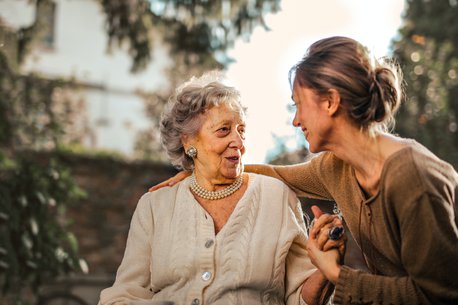
Retirement should be a period in which we can be comfortable and enjoy some well-deserved free time after a lifetime of working.
However, it’s important to recognize that reaching an older age can also present vulnerability. This doesn’t mean that all elderly people should be treated with kid gloves. But helping them protect themselves can be an invaluable form of support.
A key focus here should be on issues surrounding elder abuse. It’s an unfortunate reality that as people get older, criminals and unethical individuals will try to take advantage of perceived weaknesses. As those over the age of 50 represent 70% of the nation’s wealth, one of the primary ways elderly people are targeted is for their finances and assets.
Recognising signs of exploitation isn’t always easy, though. So, let’s take a look at some of the main signs of elder financial abuse.
4 Signs of elder abuse...
1. Transference of Assets
One of the most common signs of potential elder abuse is the transference of assets. Criminals often focus their efforts on the physical and valuable assets of elderly people. This is because these can go undetected for longer than more conspicuous absences of cash.
Larger items, like houses and cars, are likely to be more immediately noticeable when ownership has been transferred. However, that's not to say that your loved one hasn’t been duped by an investment or loan scheme that uses these properties as collateral. Talk about assets like their pension, too, as there is a range of pension scams at the moment that encourages elderly people to transfer their pension pots in exchange for a lump sum.
If small valuables, such as jewellery or furniture, are going missing, this should also be considered a red flag. It may be the case that someone providing care or a family member is taking advantage of the memory challenges often associated with dementia. Your elderly relative may also have given permission to sell these items but is receiving less back than the amount truly gained. It’s important to get as much information as possible when valuables and other assets start to wander.
2. Unexplained Poverty
Many elderly people today are facing increasingly difficult financial circumstances. We are in the midst of a cost-of-living crisis and often don’t stretch as far as previously expected. Indeed, retirees often accumulate credit card debt to make ends meet. This financial tightrope walk is one of the reasons that elder financial abuse can be so destructive. However, tighter finances than usual can also be a warning sign that abuse is present.
This isn’t often a case of immediately noticing less money in a loved one’s bank account. Rather, the signs are usually in the form of unpaid bills or invoice reminders. Though the UK is certainly experiencing higher utility costs than usual, it’s important to talk to your elderly relative about any reminders received. It may be the case that those tasked with paying bills have simply pocketed the money or they have cancelled direct debits to be able to withdraw and keep the cash.
Another area to look out for here is reduced food in the home. If your loved one is experiencing sudden and unexplained food poverty, look beyond the easy excuse of inflation. If a third party is purchasing food on their behalf, review the orders and receipts thoroughly. Look out for discrepancies in the amount of money provided and the food returned. Wherever possible, assist your elderly relative in setting up online ordering and delivery services that are more reliable and transparent.
3. Evidence of Online Fraud
Among the most common types of elder abuse at the moment comes from online sources. Cybercriminals increasingly target pensioners and those considered to be vulnerable. The digital landscape can be a positive tool for the elderly, but it’s important to be on the lookout for signs that your loved one has been targeted.
This may include phishing emails. These often come in the form of correspondence claiming to be from a bank or other financial service provider. It may suggest that an account has already been breached and the holder should click on a link or reply with key identifying information. This can then be used to access accounts fraudulently.
Alongside being vigilant of these signs, educating yourself and your loved one about how to avoid these risks in the first place is invaluable. Adopting good digital hygiene is a key approach to fraud protection. This includes utilising multi-factor authentication to access any accounts. Keeping strong passwords and maintaining secrecy on these are also vital. Encouraging your elderly relative to verify with financial institutions that email correspondence received is genuine can help reduce their exposure to risks.
4. Bank Account Changes
Bank accounts are among the primary targets for those perpetrating elder financial abuse. Some signs to look out for here include the presence of additional names on any correspondence from the bank or bank statements. The ordering of additional cards in someone else’s name is also a common tactic. A trusted party or carer may have convinced your loved one to order this. Indeed, they may have claimed it would be used to make legitimate purchases on the senior’s behalf.
As such, one of the most important ways to protect elderly relatives is to encourage elderly them to review their financial accounts with you occasionally. This can help your loved one both maintain control of their finances and offer opportunities to highlight any evidence of fraud. Your goal here should always be to empower your elderly relatives. You’re collaborating in looking for these signs and helping to maintain security, not removing agency over their affairs from them.
Summary
Your loved ones deserve a retirement in which they feel comfortable and financially secure. As such, it’s important to be vigilant for signs of financial abuse. This may come in the form of illegitimately transferred assets and bank account changes. Increasingly, retirees are victims of online fraud, too. Even subtle signs of unexplained poverty may be an indicator that abuse is occurring. Work alongside your loved one to maintain strong protective procedures and a good standard of living.

